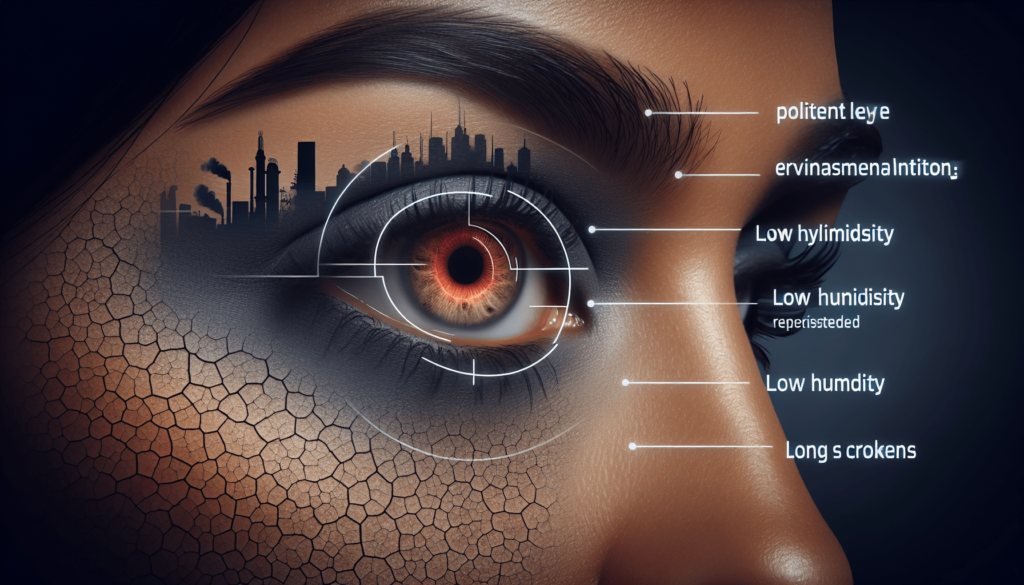Welcome to an insightful exploration of the relationship between thyroid disorders and the development of dry eye syndrome. Thyroid imbalances can directly impact the health of your eyes, leading to symptoms like dryness, irritation, and discomfort. By understanding the connection between these two conditions, you can take proactive steps to manage your thyroid health and alleviate dry eye symptoms. Let’s dive into the fascinating world of thyroid disorders and their influence on your eye health.
How Do Thyroid Disorders Influence Dry Eye Development?
Have you ever wondered why some people experience dry eyes more frequently than others? Well, one possible explanation could be related to thyroid disorders. Your thyroid plays a crucial role in the body’s overall functioning, including the health of your eyes. In this article, we will explore how thyroid disorders can influence the development of dry eye syndrome and what you can do to manage it effectively.
Understanding the Thyroid Gland and its Function
Let’s start by understanding the basics of the thyroid gland and its function in the body. The thyroid gland is a small, butterfly-shaped organ located at the base of your neck. It plays a crucial role in producing hormones that regulate various bodily functions, such as metabolism, heart rate, and body temperature.
Thyroid Hormones and their Impact on Eye Health
Thyroid hormones, namely triiodothyronine (T3) and thyroxine (T4), have a direct impact on eye health. These hormones influence the production of tears, which are essential for maintaining the health and lubrication of the eyes. Imbalances in thyroid hormone levels can lead to changes in tear production, resulting in dry eyes.
Common Thyroid Disorders and Their Connection to Dry Eye Syndrome
There are several thyroid disorders that can influence the development of dry eye syndrome. Let’s take a closer look at two of the most common ones: hypothyroidism and hyperthyroidism.
Hypothyroidism
Hypothyroidism, also known as an underactive thyroid, occurs when the thyroid gland does not produce enough thyroid hormones. This condition can lead to a decrease in tear production, causing dry eyes. Other symptoms of hypothyroidism include fatigue, weight gain, and cold intolerance.
Hyperthyroidism
Hyperthyroidism, on the other hand, is an overactive thyroid condition characterized by the excessive production of thyroid hormones. This hormonal imbalance can also affect tear production, resulting in dry eyes. Individuals with hyperthyroidism may experience symptoms such as weight loss, increased heart rate, and heat intolerance.
Thyroid Eye Disease (Graves’ Disease)
Graves’ disease is an autoimmune disorder that affects the thyroid gland and can lead to thyroid eye disease. This condition is characterized by inflammation and swelling of the tissues around the eyes, causing symptoms such as eye bulging, double vision, and dry eyes. Thyroid eye disease can significantly impact tear production and exacerbate dry eye symptoms.
Symptoms of Dry Eye Syndrome in Individuals with Thyroid Disorders
If you have a thyroid disorder, it’s essential to be aware of the symptoms of dry eye syndrome. Common symptoms include:
- Feeling of dryness or grittiness in the eyes
- Redness and irritation
- Blurred vision
- Sensitivity to light
- Excessive tearing
- Eye fatigue
These symptoms can vary in intensity and may worsen in certain conditions, such as prolonged screen time or exposure to dry air. If you experience any of these symptoms, it’s crucial to consult with an eye care professional for a proper diagnosis and treatment plan.
Managing Dry Eye Syndrome in Individuals with Thyroid Disorders
Managing dry eye syndrome in individuals with thyroid disorders requires a comprehensive approach that addresses both the underlying thyroid condition and the dry eye symptoms. Here are some tips to help you manage dry eyes effectively:
1. Medication Management
For individuals with hypothyroidism or hyperthyroidism, proper medication management is essential to regulate thyroid hormone levels. Maintaining a consistent medication routine prescribed by your healthcare provider can help improve tear production and alleviate dry eye symptoms.
2. Eye Drops and Lubricants
Using lubricating eye drops or artificial tears can provide relief from dry eye symptoms by supplementing natural tear production. Choose preservative-free eye drops specifically formulated for dry eyes and use them as needed throughout the day to keep your eyes moisturized.
3. Proper Eye Care Habits
Practicing good eye care habits can help prevent and alleviate dry eye symptoms. Remember to:
- Take frequent breaks during screen time to rest your eyes
- Use a humidifier to maintain optimal humidity levels in indoor environments
- Protect your eyes from harsh outdoor elements, such as wind and sunlight, with sunglasses
4. Warm Compresses and Lid Hygiene
Applying warm compresses to your eyes and practicing lid hygiene can help improve tear quality and reduce eye discomfort. Use a clean, warm washcloth to gently massage your eyelids and promote tear flow. Be sure to follow proper hygiene practices to prevent eye infections.
5. Nutrition and Hydration
Maintaining a healthy diet rich in omega-3 fatty acids, vitamins A, C, and E, and staying hydrated can support overall eye health and alleviate dry eye symptoms. Incorporate foods such as fatty fish, leafy greens, citrus fruits, and nuts into your diet to nourish your eyes from the inside out.
6. Consult with an Eye Care Professional
If you continue to experience persistent dry eye symptoms despite following these tips, it’s essential to consult with an eye care professional. Your eye doctor can perform a comprehensive eye exam, evaluate tear production, and recommend further treatment options, such as prescription eye drops or in-office procedures.
Conclusion
In conclusion, thyroid disorders can have a significant impact on the development of dry eye syndrome due to their influence on tear production and eye health. By understanding the connection between thyroid disorders and dry eyes, you can take proactive steps to manage and alleviate dry eye symptoms effectively. Remember to prioritize your eye health, stay informed about your thyroid condition, and seek professional guidance when needed. With proper management and care, you can maintain healthy eyes and enjoy clear vision despite thyroid-related challenges.


